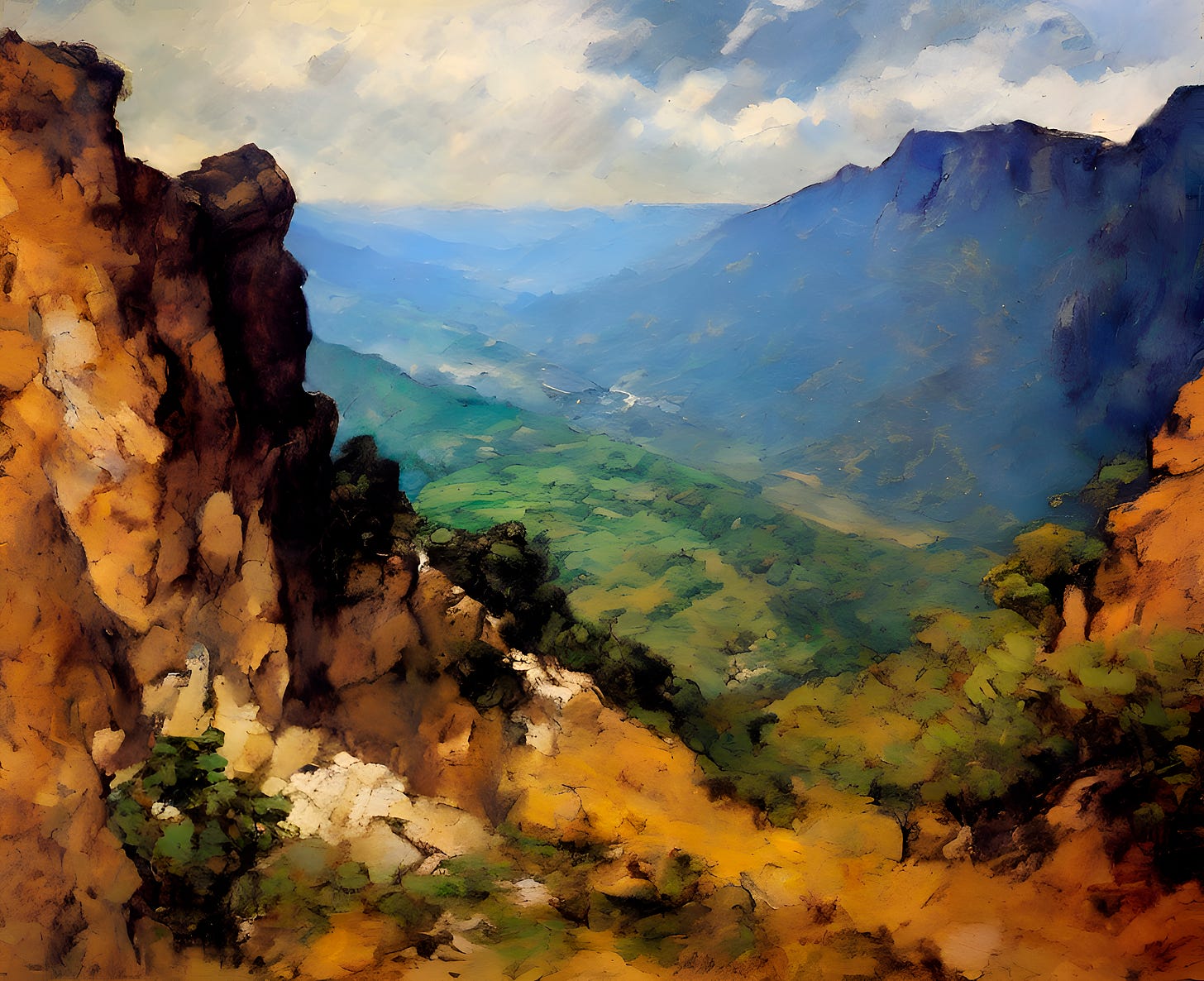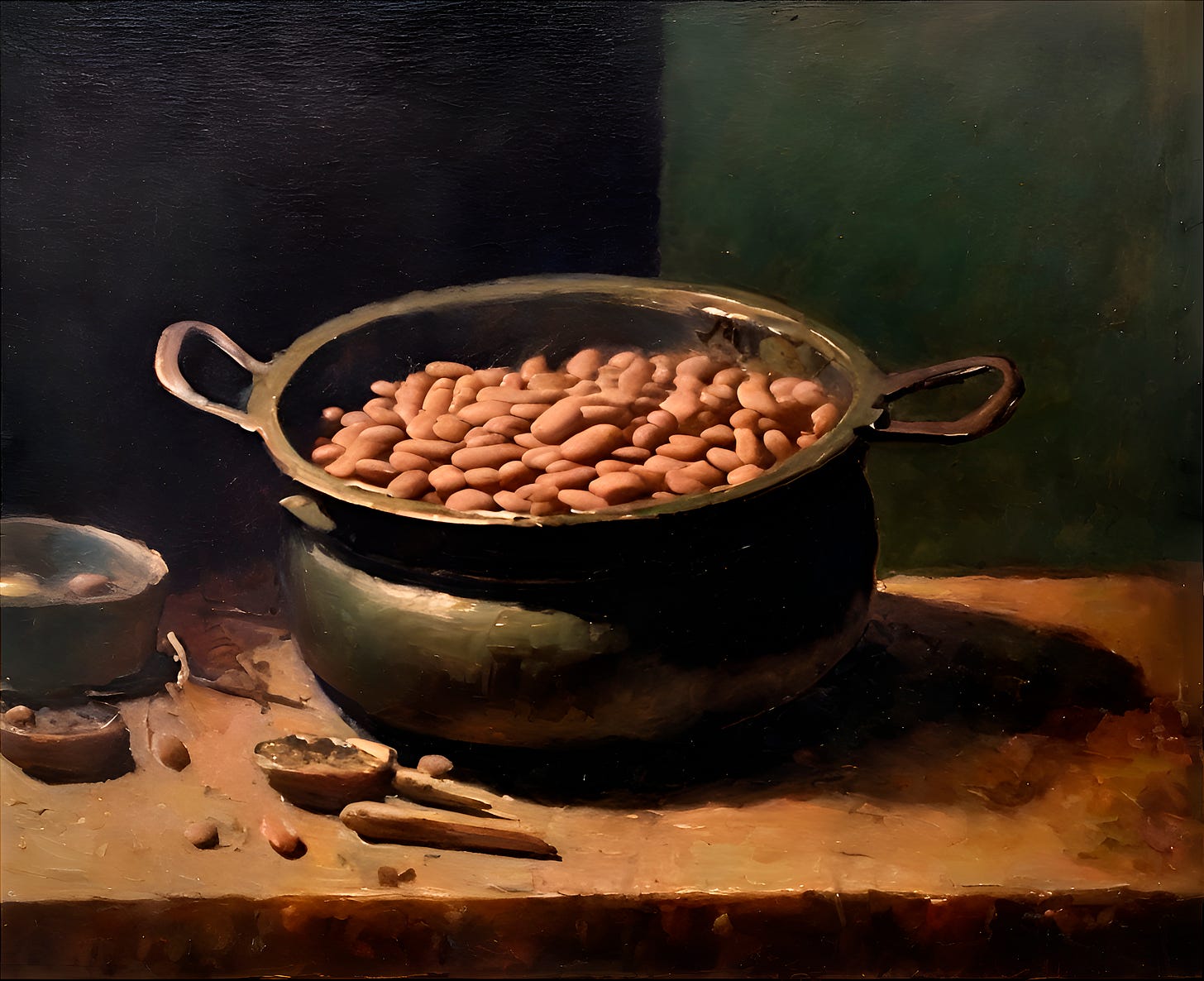What's Left of Martha [ENG]
Fiction in preparation for the Spanish-language translation of my debut anthology Juvenilia Tapatía; en la manera de Agustín Yáñez 2013-24
No fewer than thirty-four years had passed, as she watched the grime run over the lip of the pot of beans, when Angélica felt life’s first pang of grief. She was deeply alone. Los Difuntos, weary hamlet of northernmost Durango, was deserted. The men had all ridden the same rickety sheep cart to California for the strawberries. The other women left too, walking to the city in search of domestic work for the season.
In an act of kindness typical of the region they had let their canaries fly. The chirping was intense and inescapable, but only on the first night. On the second not a single one was heard. They would be back, but in the widening silence of the seething summer woods Angélica’s thoughts were booming and stentorian for the first time.
He’ll die of grief at this rate. Martha should have at least called by now.
She looked outside the window to the boy, asleep on the hammock, the shifting trail of mosquitos argentine overhead.
She could not convince him to sleep on the cot, she could not force him to eat. Day and night alike, he spent the time rocking himself, staring out into the wood from behind the netting. There were no tears, at least not yet.
This boy doesn’t understand just how much his mother loves him.
How deeply his mother loved him! Martha kept him in the womb as long as she could, waiting so long that he crowned on the road to the hospital. Martha unleashed him on the world in a spectacle, baying wildly as he emerged and dropped into Angélica’s arms. How shocked were they when still squatting over the bloody mass of sweaters, Martha tore the umbilical cord with her own teeth.
On the spot she named him Ángel. How loved was this boy, mimado y consentido; like no other child in town had ever been. Those present told all who would listen that the moon had shaken and they saw the Virgin herself, cloaked in a satin cape, shining behind Martha and Angélica as he emerged with open eyes and all his teeth. He had fourteen guardian angels, the witch from the mountains had said at his baptism. Keep him and love him. This boy, his teeth straight and square like graves, was to bestow on them all some great thing, some great day.
Again the pot boiled over and the deep throb of sadness broke the spell of memory. To the screeching beads of water Angélica took as if they were the entrails of temple birds. In the crackling trails of starch on the camping stove was the worst news, was every fear confirmed.
Martha was so selfish. All our lives she has been selfish. Her selfishness killed our father and now she’s gone and died. I knew it. I knew this day would come. It has been four weeks and not a single call. What am I to think? Selfish even in death, leaving me of all the unhappy people in this world with this boy to look after.
To mind came the treasury of sisterly secrets, the resentments hushed only because there was no time to speak them. Now there was nothing but time.
When Michael, the recruiter, came in his gleaming red truck and crisp linen shirt, she knew Martha had fallen in love on the spot. When the girl confirmed it, Angélica struck her in anger. It would be the only confrontation they would ever have. Angélica turned the other way whenever Martha snuck back into their mother’s house mid night and again when Martha brought home the abortion herbs under her shawl two times, then a third, final time a year before Ángel had been born. It had always been Angélica who steeped the tisane and held her hand through the vertigo.
This boy, this boy… I can’t take care of this boy. I’ll leave him. In the city. Good Lord, forgive me. I can’t keep this boy. Send me a sign.
Again the pot boiled over.
If I leave him, in the forest… I’ll take him to the mountain, leave him in the gulch where the runners leave all those bodies. I’ll flee, up north. God knows I know the way. Martha you are so selfish!
She looked outside at the boy, asleep on the hammock, the trail of mosquitos argentine overhead.
Angélica stumbled to the only room and sat on the cot before the oxidizing plate photograph. She took the crucifix and the earrings off, placed them in the mason jar. She picked up her mother’s holster, took the antique pistol from the wall and tied it to her belt.
Her mother had been a revolutionary. The story still circulated in the vanishing cantinas of the city in Sonora; the fanciful flight of the girl who killed an American industrialist and got away with it.
Martha, if only I had told you then. Mother should have known! Mother should have known just what you did! And when you were hiding in California ¡cowardly woman! from your mother who was dying, when she called for you and only you, when holding my hand she pined for yours, I still said nothing. Martha! You did not deserve this boy.
At the very thought of her mother withering away in her death bed, Angélica was consumed with a frightening anger. She hurried, grabbed the gold and the bundle of bills and placed it in the jar and onto the bed. Walking back to the makeshift kitchen she turned the key of the propane tank, ladled a bowl for the boy, and put the lid on the pot of beans still roiling. She crumbled the hard cheese over the top and covered it with a wet cloth.
Running faster than her regrets, she could feel the years pounding in her chest. She made it out the house, made her way unsteadily up towards the path that led to the mountain.
The coolness of the evening evinced Martha’s death. The sweat that broke through her tawny skin evinced Martha’s death. The clap of her leather thongs against the flat rocks evinced Martha’s death. Angélica was steeled by these signs, certainty beyond what any autopsy could deliver.
How many men, Martha? How many men offered to marry you, to take you away and keep you comfortable? How many times did mother plead with you to leave the idea of a Michael? You barely made it back the last time you left. And you chose him, even over the fruit of your own body. He did not love you! Silly girl! Martha, I see him and only him when I look at him. The brassen hair, the blue eyes. I can not love him when I only see that Michael.
And now, sister, where are you? What has come of you? Has someone found you? I cannot think of you lying in the sun, crouched under the scrub for shade. You, doted girl, loved girl, spoiled girl, turning to dust in the desert!
In her childhood she had ascended these very mountains to harvest mushrooms in the darkest minutes of the evening before they had ejected the precious spores. How happy were the witches and mountain women when they saw her small frame's edges gilt in sunrise, the sack full of mycots and dirt-caked roots.
The memory of crows feet and black veils dissolved into the tops of trees, silhouettes Angélica could just make out. The canopy’s wagging fingers feathered into the emptiness of that lonely summer night until again emerged wisps of stars, so feeble.
Sister, what lengths have you pushed me to. What desperation have you left in your absence. When I needed you, you fled. And now when your child needs me, most of all, I flee.
But how sweet was the smell of mountain pine, of sun-bleached stone. She lost her fears among the inane murmuring of bark beetles and fat grubs making kindling of time-hewn trunks. All around the memories hissed. Her mother was alive again in every particle of the mountain and the higher she ascended, the more plain and raw the memory became. Phosphorous in the heart, every vagrant thought was a match striking against her resolve to forget.
Martha, sister, if I was ever unkind or failed you, it was for the weakness of my own will. Sister, if I had been stronger, would you have stayed? What kind of love was shown to you by that man that you would risk your life and your child’s? Foolish girl, always chasing after love. It’s why our mother loved you best. Where I tended her patience, you sought her love. And got it. Foolish girl. Lucky girl. But now, what love is shown to you?
Close enough to the ravine to hear the water froth over the sharp rocks, Angélica let out an arching groan that echoed from below and above. Her mother came back into mind; the days spent slapping soapy shirts against boulders by the same coursing water. She blushed remembering the lovers caught mid-embrace, remembering her mother’s stern rebuke of the silly girls who would have left their families for boys who couldn’t grow a mustache. How red would they turn when her mother lifted her skirts to show them the stretch marks and cesarean scar. This is what men do.
Angélica recalled the times she saw her mother rub the scar while she sat entranced by the woods. You came from here. Her mother would press her hand against it, force the small, bony fingers to glide over the knotted skin. The resins puddling was the true scent of guilt. The smell settled into her hair, color of wet cedar trunks.
There, peering out in vain over the lip of the cliff and into the abyss as dark and immense as it had always been, she was a girl again. Her lips trembled, they caught the mist of the whistling river. Her wheezing, tired breath whined along with her chest’s tympanic rhythm.
The ravine called her name, whispered condemnations for leaving the boy alone and for cursing her sister. Martha. Martha. Martha. The wind carried her name and her scent; peppery red carnations. While what was left of Martha was surely making its rounds through the desert, Angélica was alive, peering over the edge thinking to the boy, asleep on the hammock, the trail of mosquitos argentine overhead. And the pistol in the holster. And the space between the edge and the floor of the ravine.







My god. Here I am, phone in hand, sat in the silver rumbling faintly urine-scented train car and I was transported. Thank you paisa.